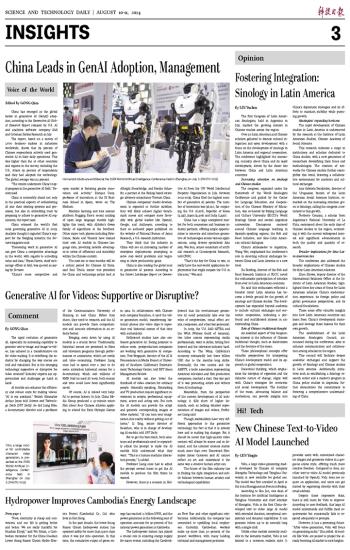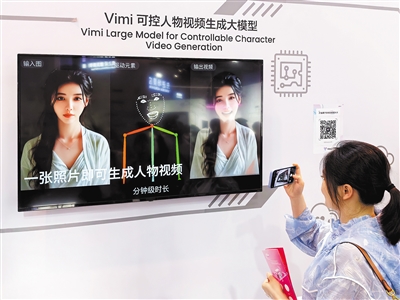
 |
| Vimi, a large model for controllable character video generation, is presented at the 2024 World Artificial Intelligence Conference held in Shanghai on July 5. (PHOTO: VCG) |
The rapid evolution of generative AI, especially its increasing capability to generate text-to-image and image-to-video, has ushered in a transformative era for video making. It is redefining the industry by changing the way stories are told and visualized. But is the emerging technology supportive or disruptive for video creators? Industry experts say opportunities and challenges go hand in hand.
AI models can enhance the efficiency and reduce costs for making videos. "AI is my assistant," British filmmaker Arthur Jones told Science and Technology Daily (S&T Daily). So did Liang Bibo, a documentary director and a professor of the Communication University of Zhejiang in east China. Before they shoot, they need to research and the AI models can provide them comprehensive and accurate information in an orderly format.
Bringing costs down by using AI models is a crucial factor. Traditionally, historical scenes are presented in films and television programs through performances or animations, which are costly and time-consuming. Professor Liang once had to spend over a year to do some animation historical scenes for a documentary, which cost millions of RMB. Had he used AI tools, both money and time could have been significantly saved.
Of course, AI is indeed very helpful to portray history. In July, China Media Group produced a 15-minute micro film about four Chinese athletes applying to attend the Paris Olympic Games in 1924. In collaboration with Chinese tech company Kuaishou, it used the video generation model, transforming historical photos into video clips to reproduce real historical scenes of that time with authenticity.
Hollywood studios have also embraced generative AI. Facing pressure to reduce costs, postproduction companies are working with generative AI companies, Yves Bergquist, director of the AI & Neuroscience in Media Project at University of Southern California's Entertainment Technology Center, told MIT Sloan Management Review.
AI models can also lower the threshold of video creation for ordinary people. Generally speaking, filmmaking and TV production require significant investment in scripts, professional equipment, actors and acting sets. But now, the AI models can provide the script and generate corresponding images or video material. "AI can turn your imagination into reality without getting out of home," Li Yang, senior director of Kuaishou, who is in charge of developing Al models, told S&T Daily.
But to get the best result, both amateurs and professionals need to repeatedly adjust the prompt to make the AI models fully understand what they want. "This is a human-machine interaction process," Li added.
Professor Liang once had to adjust the prompt several times to get the AI models to produce the film frame he wanted.
However, there is a concern in Hollywood that the revolutionary generative AI could potentially take over the roles of scriptwriters, visual effect artists, composers, and other key personnel.
In 2023, the U.S. SAG-AFTRA and the WGA (Writers Guild of America), two labor unions representing media professionals, went to strike, hitting Hollywood and the television industry hard. According to The Wrap, California's economy estimatedly lost three billion USD due to the months-long strike. Eventually, the two unions and the AMPTP, a trade association representing American television and film production companies, reached a deal. One key part of it was protecting artists and writers from AI technology.
Meanwhile, from the perspective of the current development of AI technology, it falls short of higher demands, such as lacking detailed representation of images and videos, Professor Liang said.
Though stakeholders have very different approaches to the generative technology, the fact is that it is already here and is making big changes. But it should be noted that high-quality video content will always be scarce and in demand, and the talented creators matter much more than ever. Renowned filmmaker James Cameron said AI cannot reflect on art and understand it the same way a creative human artist can.
The future of the film industry lies in finding the right integration and subtle balance between human artistry and technological capabilities.


 Next
Next




